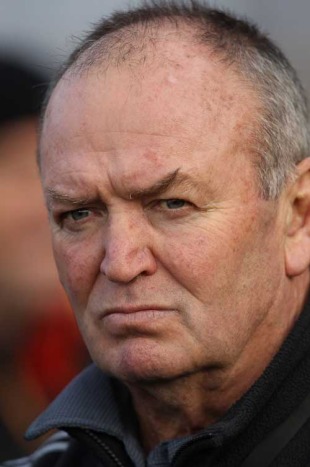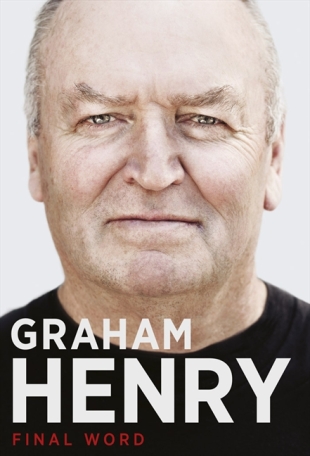|
Comment
'Thought Police' rightly round on Henry
Graham Jenkins
July 29, 2012

Graham Henry has caused a stir with his views on New Zealand's exit from the 2007 Rugby World Cup
© Getty Images
Enlarge
It was in the pages of George Orwell's famous novel 1984 that we first encountered the 'Thought Police' but you could be forgiven for thinking that they also patrolled the realms of Twitter given the reaction to extracts from Sir Graham Henry's forthcoming biography. The former All Blacks coach has caused a stir with his latest recount of his side's dramatic defeat at the hands of France in their 2007 Rugby World Cup quarter-final clash in Cardiff and revealed he feared that the match may have been rigged. Henry remains baffled by the nature of their exit and more specifically by the performance of referee Wayne Barnes. Many more will be left perplexed as to why the sport's most successful ever coach would choose to rake up his former side's World Cup woe. His book, penned by Kiwi rugby journalist Bob Howitt, reveals how his own analysis of Barnes' handling of the game - including what he views as 40 missed infringements committed by the French - made him nauseous before actually throwing up. Many Kiwi fans will also have a sour taste in their mouth today. But it was not Henry's statistical breakdown, which also detailed how his side claimed 73% of territory in the last hour of the game but only drew two penalties from France, that drew scorn but a brief 'thought' that followed. Reports suggest that Henry "momentarily let the thought of match-fixing enter his mind before dismissing it" but unsurprisingly it is this potentially explosive observation that is attracting the world's attention. It is important to remember that this does not appear to be a concrete claim that the match was rigged and if the book does actually include such a thing then you would think that the marketing men at publishers Harper Collins would have ensured that was drip-fed to the media - having been passed through the legal department. It was a suspicion. As Henry has since clarified: "I asked the rugby union and the International Board if there were any laws or any system that they use to look at bizarre games and look at the possibility of sports betting. But apparently they don't which surprised me." In the aftermath of what he saw as an unfathomable defeat and with what he viewed as compelling evidence he let his mind ponder the unthinkable. There is no direct allegation that the result was fixed and so legal moves against him may not be forthcoming although Barnes - a qualified barrister - will rightly be interested in any suggestion that he was not playing by the laws. The latest slight on his character emanating from that part of the world will surely test his commendable refusal to enter a war of words.
Action from the International Rugby Board may also be warranted with Henry's conduct arguably not befitting of someone recently appointed to the governing body's influential Rugby Committee. To accuse or even hint that a referee fixed a game is simply not acceptable without any evidence beyond stats that illustrate nothing more than the fact that your side failed to capitalise on its dominance. It is not only ludicrous but also highly unlikely given the complicated nature of the sport with its numerous moving parts. More immediate castigation came in the form of a hail of criticism launched towards him via the ever-popular social media platforms. "Astonishing claim by Graham Henry... seems like sour grapes to me" wrote one of many drawn to comment on Twitter with another adding: "Graham Henry, never really your biggest fan, but even less so now."

Graham Henry's controversial biography will be published later this week
© Getty Images
Enlarge
But it was not just aggrieved fans taking to the internet to air their anger at Henry with notable rugby correspondents also quick to criticise. "Puke-making assault on Wayne Barnes by bitter Graham Henry" wrote the Sunday Times' correspondent Stephen Jones while the Daily Telegraph's Brendan Gallagher commented: "Hilarious Graham Henry trying to rewrite history." They may have been short of all the facts regarding the actual content of the book but their belief that the All Blacks simply lost to a better side is clear. Although Henry stops short of a game-shattering accusation, there can be little doubt that his decision to return to the subject and once again point the finger at Barnes and his assistants was calculated. As bitter as he may still be about that certain chapter in the All Blacks' history and his desire to see his book fly off the shelves it is questionable to say the least as was the decision of former South Africa coach Peter de Villiers to fire a similar broadside ahead of the publication of his own book. It will in all likelihood generate a welcome spike in sales when the book is published this week but it could also undo much of the goodwill he has harvested since steering the All Blacks to the World Cup crown last year. Henry has also revealed that the NZRU doused his fire at the time - "They told me to pull my head in and relax and get on with it, and quite frankly that advice was the correct advice" - it is just a shame he did not maintain his silence. © ESPN Sports Media Ltd. Graham Jenkins is the Senior Editor of ESPNscrum and you can also follow him on Twitter.
| |||||||||||||||
Live Sports
Communication error please reload the page.
-
Football
-
Cricket
-
Rugby
-
- Days
- Hrs
- Mins
- Secs
F1 - Abu Dhabi GP
Abu Dhabi Grand Prix December 11-131. Max Verstappen ()
2. Valtteri Bottas (Mercedes)
3. Lewis Hamilton (Mercedes)
4. Alexander Albon ()
5. Lando Norris ()
6. Carlos Sainz Jr ()
-
ESPNOtherLive >>
Boxing - Nelson v Wilson; Simmons v Dickinson; Joshua v Gavern (Metro Radio Arena, Newcastle)
Golf - Houston Open
Snooker - China Open
Tennis - Miami Open

